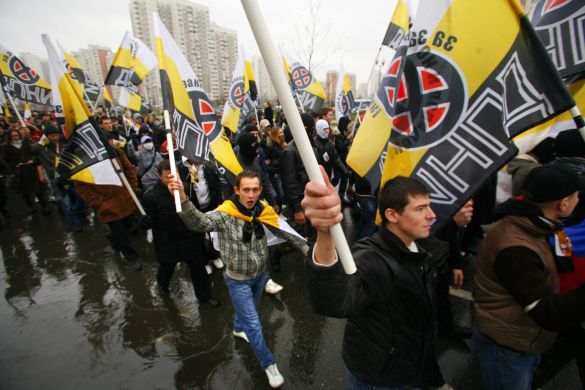
Is Russia Stable Without Putin?
Publication: Eurasia Daily Monitor Volume: 9 Issue: 34
By:

Russian nationalists have been one of the main groups participating in the protests against the fraudulent elections of December 4, 2011. Among their number are more extreme nationalists or neo-Nazis and the two groups have a number of common aims. Indeed, one of the leaders of the protests, the blogger Alexander Nevalny, has called for the rights of the ethnic Russian “core” to be represented within the Russian Federation. Other leaders of the nationalist “Russians” faction of the protests include the former chief of the now-defunct nationalist party Rodina (motherland), Dmitry Rogozin; the head of the now-banned “national-socialist movement” Slayvanksy Soyuz (Slavic Union), Dmitry Demushkin; and the leader of the racist Dvizhenie Protiv Nelegalnoi Immigrazi (Movement Against Illegal Immigration), Alexander Belov (real name Potkin: Belov comes from the Russian word for “white”).
Judging from the posts left on nationalist websites – some of which are hosted outside the country due to the Kremlin’s clampdown on these organizations and enforcement of article 282 (prohibiting incitement of national, racial or religious enmity) of the Russian constitution, which began at the end of 2010 (Sova report, 2011) – the extreme nationalists have decided to put aside their differences with the liberals and the left in the name of getting rid of “the corrupt junta of Putin” (https://dpni.org/articles/novostnaya/29030/). It should be stressed that this may not result in a decrease in skinhead attacks on ethnic minorities, as most skinhead groups are not aligned with any formal organization. This temporary halt to hostilities or ceasefire has been mirrored by the leader of the so-called “Caucasus Emirate” Doku Umarov’s pledge to stop attacking Russian civilians for the duration of the protests (https://www.independent.co.uk/news/world/europe/chechen-terror-leader-halts-civilian-attacks-6358877.html).
Given that the terrorist campaign of Chechen and now Islamist rebels has been continuous since the Moscow apartment bombings of 1999, Umarov’s statement is extremely significant. This coalescence of diametrically opposed groups around a common goal is remarkable in post-Soviet politics.
Looking further down the line, however, the alliance of liberals, communists and nationalists appears to be solely a marriage of convenience that will not last beyond the honeymoon of Putin’s departure. It is unknown what might happen to a Russia without Putin. In an open letter to Nezavisimaya Gazeta on January 23, Vladimir Putin warned that the protests against the fraudulent elections of December 4 and the slogans of the protestors such as “stop feeding the Caucasus” could lead Russia to follow the same fate as the Soviet Union. Some commentators have seen in this an attempt by Putin to scare the protestors into supporting him. Yet the threat of secession remains a possibility, especially given Russian nationalists’ desire to introduce laws protecting ethnic Russians – 80 percent of the population – within Russia. The extreme nationalists have reacted hopefully to this, with Alexander Belov seeing in the protests to remove Putin the chance to finish the state-building project begun with the fall of the Soviet Union and create an ethnic state for Russians (https://dpni.org/articles/novosti__d/28502/). With 59 percent of respondents either strongly or moderately in favor of the phrase “Russia for Russians” in November 2011, there is also widespread support for ideas like these within Russia (https://www.levada.ru/15-12-2011/rossiyane-ob-obstanovke-na-severnom-kavkaze-natsionalizme-politike-i-finansirovanii-regio).
Such laws would almost certainly be deleterious for the future of the Russian Federation as a single country. At a minimum, discriminatory laws would further radicalize separatists in the North Caucasus. Indeed, that may even be part of Umarov’s calculus in calling a ceasefire to the terrorist campaign. It is also possible that under any kind of genuine democracy in Russia, the North Caucasus would vote to secede along the lines of the “Velvet Divorce” in 1993. Further afield, Putin’s fears that more than the integrity of Russia’s south would be a stake are not altogether fanciful. Tatarstan and the Far East are obvious candidates for separatism and such forces there would be buoyed by separation in the North Caucasus and discriminatory laws from Moscow.
It is also clear, however, that the extreme nationalists would not welcome such separation. Indeed, Dmitry Demushkin stated in an interview with Interfax on January 23 that “Russian nationalists will never support the separation of Russia, supporting conversely the wellbeing of Russians – the preservation of the natural native nations, living on the territory of our country” (www.demushkin.com/content/news). Such rhetoric should not be taken lightly. Over the last 12 years, extreme nationalists and Neo-Nazis have been acting as virtual paramilitaries who claim to be defending indigenous Russian culture and “the white race,” by sending recruits through military training programs and attacking ethnic minorities on an almost daily basis. Despite increased police attention to such crimes, there were at least five incidences of violent assault in December 2011 alone (https://www.sova-center.ru/en/xenophobia/news-releases/2012/01/d23381/). How much worse such violence would be in a potentially anarchic situation where the police are not prosecuting crimes is hard to say. While it may be alarmist to raise the specter of Civil War at this stage, no-one should take this scenario of Civil War off the table.




